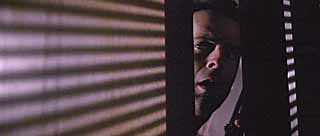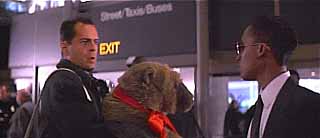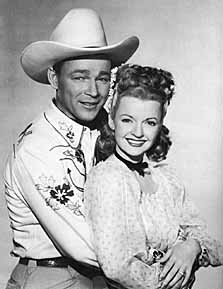|
While John Wayne was the star of major western films that took a gritty and realistic view of the West, Roy Rogers was the dapper, singing cowboy of B movie, radio and television westerns. McDonald writes how Wayne distanced himself from the B western cowboy, spurning gaudy costumes and the white hat: "Wayne's screen fights included tactics avoided by fancier cowboys such as Roy Rogers, who rarely if ever lost his white hat in a brawl, and who always fought with fairness regardless of what unfair tactics were used against him" (McDonald 122). In a Roy Rogers film, playing the hero was just that--a role to play. Roy Rogers' persona did not demand a sacrifice of self, but a humorous self-awareness instead. David Rothel writes in The Singing Cowboy of the importance of Rogers' frequent appearances as himself with Dale Evans to his overall image, where their religious faith would be mixed with songs, humor and cowboy tricks. While John Wayne was the tough loner, Roy Rogers was merely a smiling family man who believed in traditional values--but that's good enough for John McClane.

Though John is placed in a world where old-fashioned values are difficult to maintain, he still sees the world through 1950s-television tinted glasses. When rap is played, John asks for real Christmas music. When he is insecure, he finds comfort in pictures of his children. When he sees fire engines coming to his rescue, he offers to kiss the firemen's dalmation, revelling in a vision of the firehouse of days gone by. Though everyone at the Nakatomi Christmas party is more interested in celebrating money (or sex), than observing a traditional holiday, John is the one who carries presents and plays with Christmas decorations. In this upside down world, John is not interested in violence for violence's sake, avoiding violence when possible (unfortunately, violence is hard to avoid this Christmas Eve). In the tradition of his pal Roy, calling on the nostalgia of his own childhood, John is playing cowboys (and maybe hide-n-seek) with Hans. He's not out to save the day and defeat the terrorists: they are just in the way of his taking his wife home. Through his superficial resemblance to the Hero, this difference in his values expands the definition of the heroic man.
In watching the opening of the film, it is clear that John McClane is not as tough or in control as the Duke or Rambo. When we first see John McClane, he is white-knuckled during a routine landing at LAX. A yuppie tenderfoot comforts and advises John. While other passengers receive passionate welcomes, John, clutching a teddy bear, is only met by Argyle, the limousine driver sent by his wife's employer. Despite John's attempt at stoic reserve, Argyle immediately sees through him, guessing that John is estranged from his wife through his own stubbornness. Argyle sums up John's real desire: "She rushes into your arms and you live happily ever after."

But Holly does not rush into John's arms. He quickly learns that she has taken her maiden name Gennaro; though he is kissed by a man at the party, Holly does not kiss him; and her co-worker, Ellis, flaunts his sexual interest in Holly in John's face. John is not the man in control of the situation--Holly is. "Holly is made for business. She's as tough as nails," Holly's boss comments. The best that Holly offers John on his arrival is the spare room in her house, not her bed. After their talk turns into an argument and Holly leaves him alone in her office, John berates himself for picking a fight with Holly: "Great job, John. Very mature." He then removes his shoes, as advised by the yuppie, because he is feeling disoriented by the flight and this initial visit with his wife. These examples of his emasculation and awareness of his own shortcomings further separate John McClane from typical Hard Bodies.
The film is also unclear as to whether John is acting out of his economically constructed duty--his job/identity as a cop--generally a defining mark of a Hero. Does he take on the terrorists as Lt. McClane or merely as John? In his conversation with Argyle, John tries to blame his separation from Holly on his commitment to the NYPD, painting himself as another victim of the "white man's burden." But Argyle calls his bluff: "You just didn't think she'd make it and she'd come crawling back to you." Argyle dismisses John's total identification as a cop. When Holly tells Ellis that John is doing his job, Ellis corrects her, "His job is 3,000 miles away," confirming Argyle's position that John's cop identity is not in play tonight.
page 2 of 3
 
|


 Roy Rogers was never the ideal Hero that John Wayne was: Rogers was the flamboyantly dressed, happily married, singing cowboy. Like John McClane, Roy Rogers preferred to defeat the villain with his fists and his wit, not his gun. Rogers' on- and off-screen relationship to his leading lady Dale Evans was important to him, not pushed aside so he could perform a man's duty, like many of the Duke's heroines. Roy and John's self-conscious humor allow them to resist society's constructions of them as sacrificial Heroes.
Roy Rogers was never the ideal Hero that John Wayne was: Rogers was the flamboyantly dressed, happily married, singing cowboy. Like John McClane, Roy Rogers preferred to defeat the villain with his fists and his wit, not his gun. Rogers' on- and off-screen relationship to his leading lady Dale Evans was important to him, not pushed aside so he could perform a man's duty, like many of the Duke's heroines. Roy and John's self-conscious humor allow them to resist society's constructions of them as sacrificial Heroes.




